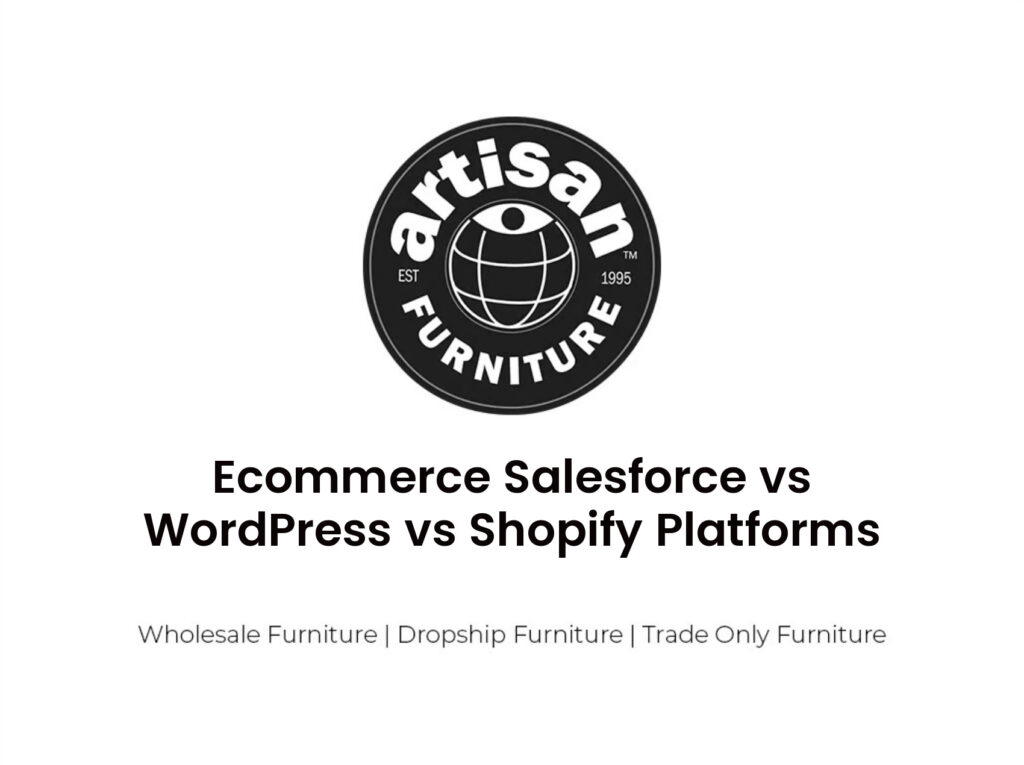Ecommerce Salesforce vs WordPress vs Shopify Platforms
In today’s rapidly evolving world of ecommerce, platforms like Salesforce, WordPress, and Shopify have become indispensable tools for businesses.
While Salesforce and WordPress have their own unique strengths, Shopify stands out as a comprehensive commerce solution. With its seamless integration of online and offline selling, robust security measures, and built-in fraud protection, Shopify offers a user-friendly and secure platform for designing and launching online stores.
In this article, we will explore the key features and advantages of these ecommerce platforms.
Table of Contents
ToggleSpecialization in Commerce
The specialization in commerce is an important factor to consider when choosing between Salesforce, WordPress, and Shopify platforms. Each platform has its own unique strengths and weaknesses when it comes to serving the needs of businesses in the commerce industry.
Salesforce, originally a CRM sales tool, may not be the ideal choice for businesses focused on ecommerce. It lacks features such as a first-party POS system and integrated online and offline sales capabilities.
Similarly, WordPress, originally a CMS for building blogs, may not offer the necessary tools for seamless commerce operations. It also lacks a first-party POS system and requires third-party tools for offline selling.
On the other hand, Shopify is specifically designed as a commerce platform, making it a top choice for businesses in the industry. It offers a comprehensive set of features, including a first-party POS system for unified sales reporting and integration of online and offline sales. This makes it easier for businesses to manage their inventory and streamline their operations.
For businesses in the dropshipping, wholesalers, or home decor industries, Shopify’s specialization in commerce is particularly advantageous. It provides built-in fraud protection and risk assessment options, making it easier to ensure secure financial transactions. Additionally, Shopify offers advanced inventory features and custom staff permissions, catering to the specific needs of businesses in these sectors.
Better Security
Enhance the security of your ecommerce website by choosing a platform that provides SSL certificates and built-in fraud protection, such as Shopify. When it comes to running an online business, security should be a top priority. With the increasing number of cyber threats and fraudulent activities, it is crucial to protect your customers’ sensitive information and ensure safe transactions.
Shopify stands out in terms of security features. It provides SSL certificates, which encrypt the data exchanged between your website and your customers’ browsers, ensuring secure browsing. This is especially important when customers enter personal and financial information during the checkout process. Additionally, Shopify is certified Level 1 PCI DSS compliant, meaning it meets the highest security standards for processing financial transactions.
In contrast, platforms like Salesforce and WordPress do not offer SSL certificates or built-in fraud protection. While you can still use third-party tools for these features, having them integrated into your platform simplifies the process and provides an added layer of security.
For ecommerce businesses that consider dropshipping or work with wholesaling suppliers, security becomes even more crucial. By choosing a platform like Shopify, you can ensure that your customers’ information is protected throughout the entire transaction process.
Whether you are selling home furniture or any other products, providing a secure shopping experience is essential for building trust with your customers. By selecting a platform like Shopify, you can rest assured knowing that your ecommerce website is equipped with the necessary security measures to protect your business and your customers.
Offline Selling Tools
An offline selling tool is an essential component for businesses looking to expand their sales beyond the online realm. While Salesforce and WordPress do not offer a first-party POS system, Shopify provides a seamless integration of online and offline sales with its POS system. This means that businesses using the Shopify platform can easily manage their sales both in-store and online through a unified reporting system.
Shopify’s POS system also offers additional features such as custom staff permissions and advanced inventory management, allowing businesses to have more control over their offline selling processes. On the other hand, Salesforce and WordPress require businesses to rely on third-party tools for offline selling, which may not provide the same level of integration and convenience as Shopify.
Furthermore, Shopify’s built-in fraud protection features set it apart from Salesforce and WordPress. With risk assessment options for customer orders, businesses can easily assess the level of risk associated with each transaction, minimizing the chances of fraudulent activities. In contrast, Salesforce and WordPress lack these built-in fraud protection features and require businesses to seek out third-party tools for this purpose.
Fraud Protection
When it comes to fraud protection, Shopify stands out as it offers built-in fraud protection features. With risk assessment options for customer orders, Shopify makes it easy to assess the risk levels and prevent fraudulent transactions.
On the other hand, Salesforce and WordPress require third-party tools for fraud protection, making Shopify a more convenient option for businesses looking for a platform with integrated security measures.
Built-In Fraud Protection
With Salesforce and WordPress requiring third-party tools for fraud protection, Shopify’s built-in fraud protection sets it apart from the competition.
While Salesforce and WordPress lack built-in fraud protection features, Shopify offers robust fraud protection with risk assessment options for customer orders. This means that Shopify merchants can easily assess the risk levels of their customer orders, helping them detect and prevent fraudulent transactions.
By having built-in fraud protection, Shopify provides a secure environment for both merchants and customers, giving them peace of mind while conducting online transactions.
This feature not only saves time and effort for merchants who would otherwise need to integrate third-party fraud protection tools but also ensures a seamless and secure shopping experience for customers.
Risk Assessment Options
Shopify’s risk assessment options provide an effective solution for fraud protection in ecommerce transactions. With built-in fraud protection features, Shopify offers risk assessment options for customer orders, making it easy to assess risk levels and prevent fraudulent activities. This is crucial for businesses that want to ensure the security and trustworthiness of their online transactions.
Unlike Salesforce and WordPress, which require third-party tools for fraud protection, Shopify prioritizes the safety of its users by integrating these features directly into its platform. By offering risk assessment options, Shopify empowers businesses to make informed decisions when it comes to processing customer orders, minimizing the risk of financial losses and maintaining the integrity of their ecommerce operations.
With Shopify, businesses can have peace of mind knowing that their transactions are protected against fraudulent activities.
Easy Testing
When it comes to easy testing, Shopify stands out as it does not require any upfront payment and allows users to design and launch their store during the trial period.
Unlike Salesforce, which requires a demo before sign-up, and WordPress, which does not offer a trial period, Shopify provides a hassle-free experience for users to test out its platform without limitations.
This makes it convenient for users to explore and evaluate the features and functionality of Shopify before committing to a payment plan.
No Upfront Payment Necessary
The easy testing feature of Shopify allows users to experiment and evaluate the platform’s capabilities without requiring an upfront payment. This is a significant advantage for individuals or businesses who want to test the waters before committing financially.
With Shopify, you can design and launch your store during the trial period, giving you the opportunity to fully experience the platform and its features. Unlike Salesforce and WordPress, which either have limitations or no trial periods, Shopify provides a risk-free environment for users to explore its potential.
This feature is particularly beneficial for those who desire a sense of belonging, as it allows them to make informed decisions about whether Shopify is the right platform for their ecommerce needs without any financial commitment upfront.
Design and Launch Store
During the trial period, users can easily design and launch their store on Shopify, allowing them to test and evaluate the platform’s capabilities. This feature provides an opportunity for users to explore the functionalities and design options available on Shopify.
By designing and launching their store during the trial period, users can gain a better understanding of how their online store will look and function. This allows them to make any necessary adjustments and improvements before officially launching their store to the public.
Additionally, this easy testing feature fosters a sense of belonging for users as they have the freedom to experiment and customize their store according to their unique brand identity and customer preferences.
Trial Period Without Limitations
How can users test the platform without limitations during the trial period on Shopify?
Shopify offers a unique opportunity for users to fully experience the platform without any limitations during the trial period. Unlike other platforms like Salesforce and WordPress, which may have limitations or no trial periods at all, Shopify allows users to design and launch their store during the trial period.
This means that users can explore and test all the features and functionalities of the platform without any upfront payment. Whether it’s customizing the design, adding products, or testing payment gateways, users have the freedom to fully evaluate Shopify’s capabilities and determine if it meets their business needs.
This trial period without limitations provides users with a sense of belonging and confidence in their decision to choose Shopify as their ecommerce platform.
Seamless Integration of Online and Offline Sales
With Shopify’s POS system, businesses can seamlessly integrate their online and offline sales channels. This integration allows for a smooth and efficient operation, providing a seamless experience for both the business and its customers. By using Shopify’s POS system, businesses can easily manage their inventory, track sales, and process payments, all in one centralized platform. This eliminates the need for manual data entry or the use of multiple systems, saving time and reducing the risk of errors.
Furthermore, with the integration of online and offline sales, businesses can offer a consistent shopping experience to their customers. Whether they choose to shop online or visit a physical store, customers can access the same products, pricing, and promotions. This level of consistency builds trust and loyalty among customers, as they can rely on the business to deliver a seamless experience across different channels.
Moreover, the seamless integration of online and offline sales also enables businesses to gain valuable insights into customer behavior and preferences. By analyzing data from both online and offline sales, businesses can better understand their customers and tailor their marketing strategies accordingly. This data-driven approach allows businesses to make informed decisions and optimize their sales strategies for maximum success.
SSL Certificate for Secure Browsing
Shopify’s SSL certificate ensures secure browsing for website visitors. An SSL certificate, also known as Secure Sockets Layer, is a digital certificate that establishes an encrypted link between a web server and a browser. This encryption protects sensitive information such as credit card numbers, usernames, and passwords from being intercepted by hackers. With Shopify’s SSL certificate, customers can browse and make transactions on your website with confidence, knowing that their data is protected.
Having an SSL certificate is crucial for any online business, as it not only provides security but also builds trust with customers. When visitors see the padlock icon or the ‘https’ in the URL bar, they know that their connection is secure and that their information is safe. This can help increase conversion rates and improve customer satisfaction.
Shopify goes beyond just providing an SSL certificate. They are also certified Level 1 PCI DSS compliant, which means they meet the highest security standards for handling credit card information. This ensures that all financial transactions made on your Shopify store are secure.
In today’s digital landscape, where cyber threats are on the rise, having a secure browsing experience is essential. With Shopify’s SSL certificate, you can provide your website visitors with peace of mind, knowing that their information is protected.
Level 1 PCI DSS Compliance for Secure Financial Transactions
Level 1 PCI DSS compliance ensures the security of financial transactions for ecommerce platforms. It is a set of standards designed to protect customer credit card data and prevent fraud.
For ecommerce platforms like Salesforce, WordPress, and Shopify, achieving Level 1 PCI DSS compliance is crucial to ensure the trust and safety of their customers.
Shopify stands out in this aspect as it is certified Level 1 PCI DSS compliant. This means that Shopify has implemented the necessary security measures to protect sensitive financial information during online transactions. With its built-in fraud protection and risk assessment options, Shopify provides an added layer of security for its customers.
On the other hand, Salesforce and WordPress require third-party tools for fraud protection and do not have built-in fraud protection features. This makes it essential for businesses using these platforms to carefully choose reliable third-party tools to ensure the security of their financial transactions.
In today’s digital world, where online shopping has become the norm, customers expect their financial transactions to be secure. By achieving Level 1 PCI DSS compliance, ecommerce platforms like Shopify are able to meet these expectations and provide a safe and trustworthy environment for customers to make their purchases.
Custom Staff Permissions and Advanced Inventory Features
Salesforce and WordPress lack the ability to offer custom staff permissions and advanced inventory features, while Shopify excels in providing these capabilities.
When it comes to managing your e-commerce business, having control over staff permissions is crucial. Shopify allows you to assign specific roles and permissions to your staff members, ensuring that they have access to the right tools and information while maintaining the security of your store. This feature allows you to delegate tasks and responsibilities effectively, streamlining your operations and increasing efficiency.
In addition to custom staff permissions, Shopify also offers advanced inventory features that are essential for managing your product inventory. With Shopify, you can easily track stock levels, set up automated reorder points, and receive notifications when items are running low. This ensures that you never run out of stock and can fulfill customer orders promptly.
Moreover, Shopify’s inventory management system integrates seamlessly with its other features, such as order management and reporting, providing you with a comprehensive overview of your business’s performance.
Frequently Asked Questions
How Does Salesforce Specialize in Commerce?
Salesforce specializes in commerce by offering a CRM sales tool that helps businesses manage their sales processes. It does not provide a first-party POS system or built-in fraud protection features, requiring third-party tools for these functionalities.
Does WordPress Offer a First-Party POS System?
No, WordPress does not offer a first-party POS system. It requires third-party tools for offline selling. However, Shopify provides a POS system for unified sales reporting and seamless integration of online and offline sales.
What Are the Benefits of Shopify’s SSL Certificate for Secure Browsing?
Shopify’s SSL certificate provides secure browsing for website visitors, ensuring their data is protected. It is certified Level 1 PCI DSS compliant, offering better security for financial transactions.
Can Salesforce and WordPress Integrate Online and Offline Sales Like Shopify?
Salesforce and WordPress do not integrate online and offline sales like Shopify. Shopify offers a seamless integration of both with its POS system, providing unified sales reporting, custom staff permissions, and advanced inventory features.
How Does Shopify’s Built-In Fraud Protection Compare to Third-Party Tools Used by Salesforce and WordPress?
Shopify’s built-in fraud protection surpasses the reliance on third-party tools used by Salesforce and WordPress. With risk assessment options and integrated security features, Shopify provides a secure and seamless experience for online transactions.



